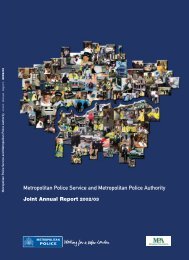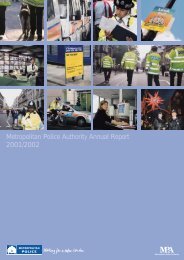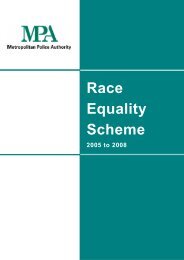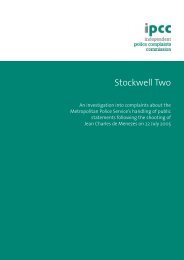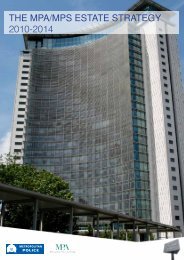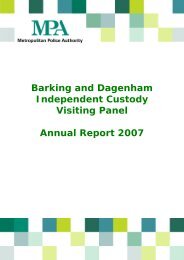Final Report of the Morris Inquiry: The Case for Change
Final Report of the Morris Inquiry: The Case for Change
Final Report of the Morris Inquiry: The Case for Change
Create successful ePaper yourself
Turn your PDF publications into a flip-book with our unique Google optimized e-Paper software.
PEOPLE ISSUES<br />
practice. To quote <strong>the</strong> HMIC’s report on Police Integrity again: “staff will judge<br />
procedures by outcomes not intentions.”<br />
We <strong>the</strong>re<strong>for</strong>e recommend that <strong>the</strong> MPS replaces its Fairness at Work policy<br />
with a new grievance procedure, based on <strong>the</strong> ACAS Code <strong>of</strong> Practice on<br />
Disciplinary and Grievance Procedures. <strong>The</strong> procedure should cover all<br />
workplace conflicts involving <strong>of</strong>ficers and staff.<br />
Resolving disputes<br />
4.86 Note 4 to our terms <strong>of</strong> reference asks us to consider “whe<strong>the</strong>r appropriate<br />
consideration is given to early resolution <strong>of</strong> grievances and conflicts, through mediation /<br />
conciliation or an internal ombudsman or o<strong>the</strong>r restorative justice techniques and whe<strong>the</strong>r<br />
<strong>the</strong>re are adequate processes to achieve such resolution.”<br />
4.87 We are, <strong>the</strong>re<strong>for</strong>e, asked to consider <strong>the</strong> use <strong>of</strong> mediation, conciliation, an<br />
internal ombudsman and restorative justice to resolve workplace conflicts in <strong>the</strong><br />
MPS. We received much evidence on some <strong>of</strong> <strong>the</strong>se issues but we are uncertain<br />
as to whe<strong>the</strong>r <strong>the</strong> concepts were always properly understood by those using <strong>the</strong><br />
terminology and whe<strong>the</strong>r individuals using <strong>the</strong> same terms had <strong>the</strong> same<br />
understanding <strong>of</strong> <strong>the</strong>ir meaning.<br />
4.88 We believe it might be helpful if we set out our understanding <strong>of</strong> what each<br />
involves:<br />
● ‘Mediation’ is a non-binding private dispute resolution process in which a<br />
neutral person helps <strong>the</strong> parties try to reach a negotiated settlement. ACAS<br />
uses <strong>the</strong> term ‘mediation’ to refer to a process <strong>for</strong> tackling disagreements at<br />
an early stage and “to nip problems in <strong>the</strong> bud.”<br />
● ‘Conciliation’ is a process similar to mediation but in which <strong>the</strong> third party<br />
takes a more active role in putting <strong>for</strong>ward terms <strong>of</strong> settlement or an<br />
opinion on <strong>the</strong> case. ACAS uses ‘conciliation’ to refer to a process after a<br />
<strong>for</strong>mal claim has been lodged to try to help <strong>the</strong> parties resolve <strong>the</strong>ir<br />
difficulties without <strong>the</strong> need <strong>for</strong> a tribunal hearing.<br />
● ‘Restorative justice’ is more commonly used in <strong>the</strong> criminal context<br />
and involves individuals taking responsibility <strong>for</strong> <strong>the</strong>ir own actions and<br />
finding <strong>the</strong>ir own solutions to repairing any damage which may have<br />
been caused. In <strong>the</strong> employment context, it has been linked closely with<br />
mediation and <strong>the</strong> parties finding a mutually acceptable settlement to any<br />
differences between <strong>the</strong>m.<br />
85


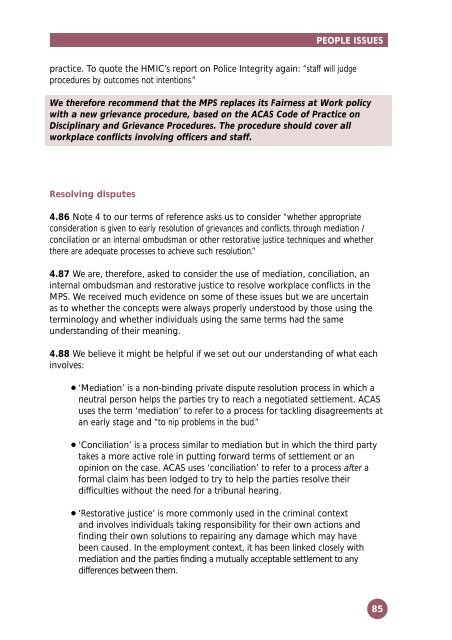
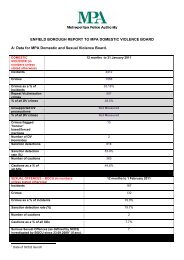
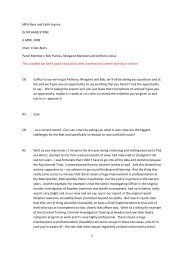
![Appendix 1 [PDF]](https://img.yumpu.com/51078997/1/184x260/appendix-1-pdf.jpg?quality=85)

![Transcript of this meeting [PDF]](https://img.yumpu.com/50087310/1/184x260/transcript-of-this-meeting-pdf.jpg?quality=85)
![Street drinking in Hounslow [PDF]](https://img.yumpu.com/49411456/1/184x260/street-drinking-in-hounslow-pdf.jpg?quality=85)

